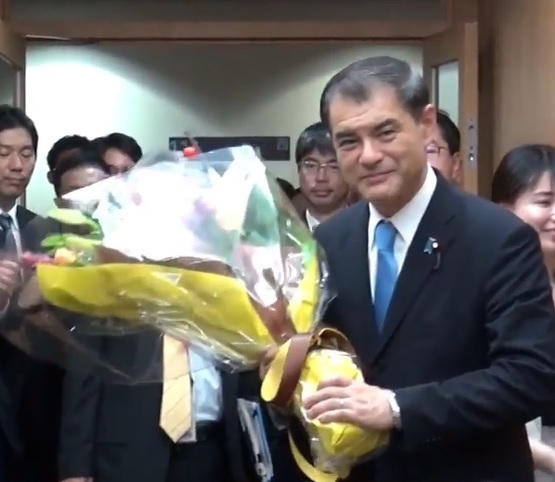 |
|
Newly appointed Japanese Minister of Education, Culture, Sports, Science and Technology Masahiko Shibayama
|
Masahiko Shibayama says Imperial Rescript on Education is option worth considering
Newly appointed Japanese Minister of Education, Culture, Sports, Science and Technology Masahiko Shibayama said the teaching of the Imperial Rescript on Education – considered a symbol of militaristic education in Japan – in the country’s schools is “worth considering.” In an inaugural press conference on Oct. 2, Shibayama was reported by Japanese news outlets on Oct. 3 as referring to “forms of interpreting [the Imperial Rescript on Education] in modern terms – for example, areas with universality in terms of possible uses in ethics and other areas.” “There has been a move to suggest that the basic content in terms of things like valuing our compatriots could be interpreted in modern terms and taught, and it is worth considering,” he continued. Having entered the Japanese Cabinet for the first time with an Oct. 2 reshuffling, Shibayama hails from the so-called “Hosoda faction” of Prime Minister Shinzo Abe’s Liberal Democratic Party (LDP). He previously caused a stir three years ago by arguing that “acknowledging same-sex marriage could exacerbate [Japan’s] low birth rate.” Shibayama’s statements echo the right-wing worldview expressed more broadly by the Abe administration. In Mar. 2017, a decision by Abe’s Cabinet on the Imperial Rescript on Education – which served as a basic guideline for Japanese education through World War II – concluded, “While it is not suitable to teach it as the sole foundation for Japanese education, we do not go so far as to repudiate its use [as a teaching material] in ways that do not violate the Constitution and the Basic Act on Education.” Critics in Japan’s opposition parties argued at the time that the decision was a “call to return to before Japan’s defeat in World War II.” The Abe administration subsequently backed down, claiming it was not calling for education on the Imperial Rescript in schools. First issued in 1890 as a “teaching” from the Meiji Emperor to the Japanese public, the Imperial Rescript on Education includes content teaching children to be “faithful subjects” of the Emperor rather than free individuals. It also includes a passage encouraging students to give their lives for the Emperor. “Should emergency arise, offer yourselves courageously to the State,” it reads. After Japan’s defeat, the Diet voted in 1948 to invalidate the Imperial Rescript on Education and removed it from schools as an infringement on basic human rights – a decision the Abe administration has recently been working to neutralize. By Cho Ki-weon, Tokyo correspondent Please direct comments or questions to [english@hani.co.kr]






